体验商务英语视听说unit
- 格式:ppt
- 大小:591.36 KB
- 文档页数:4
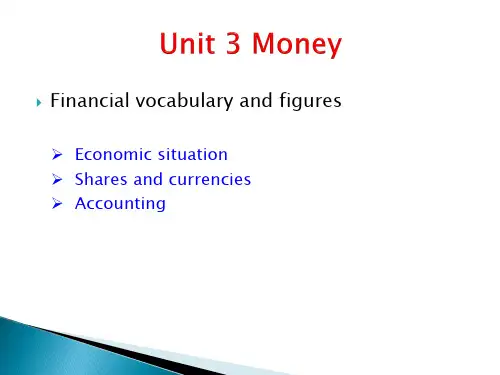
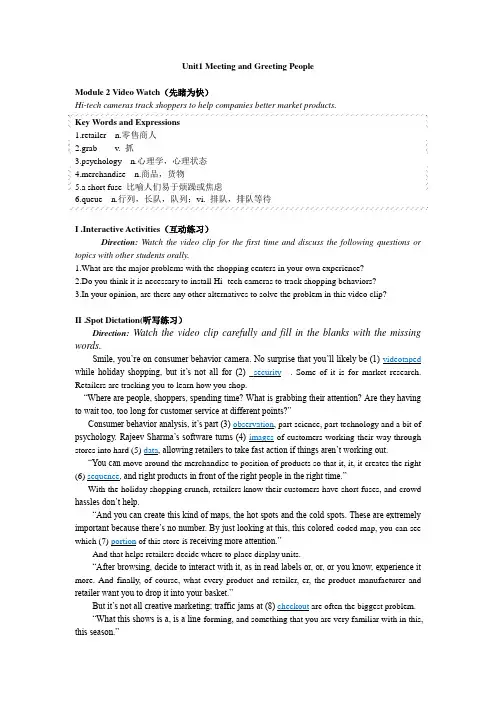
Unit1 Meeting and Greeting PeopleModule 2 Video Watch(先睹为快)Hi-tech cameras track shoppers to help companies better market products.Key Words and Expressions1.retailer n.零售商人2.grab v. 抓3.psychology n.心理学,心理状态4.merchandise n.商品,货物5.a short fuse 比喻人们易于烦躁或焦虑6.queue n.行列,长队,队列;vi. 排队,排队等待I .Interactive Activities(互动练习)Direction: Watch the video clip for the first time and discuss the following questions or topics with other students orally.1.What are the major problems with the shopping centers in your own experience?2.Do you think it is necessary to install Hi -tech cameras to track shopping behaviors?3.In your opinion, are there any other alternatives to solve the problem in this video clip?II .Spot Dictation(听写练习)Direction:Watch the video clip carefully and fill in the blanks with the missing words.Smile, you’re on consumer behavior camera. No surprise that you’ll likely be (1) videotaped while holiday shopping, but it’s not all for (2) _security__. Some of it is for market research. Retailers are tracking you to learn how you shop.“Where are people, shoppers, spending time? What is grabbing their attention? Are they having to wait too, too long for customer service at different points?”Consumer behavior analysis, it’s part (3) observation, part science, part technology and a bit of psychology. Rajeev Sharma’s software turns (4) images of customers working their way through stores into hard (5) data, allowing retailers to take fast action if things aren’t working out.“You can move around the merchandise to position of products so that it, it, it creates the right (6) sequence, and right products in front of the right people in the right time.”With the holiday shopping crunch, retailers know their customers have short fuses, and crowd hassles don’t help.“And you can create this kind of maps, the hot spots and the cold spots. These are extremely important because there’s no number. By just looking at this, this colored-coded map, you can see which (7) portion of this store i s receiving more attention.”And that helps retailers decide where to place display units.“After browsing, decide to interact with it, as in read labels or, or, or you know, experience it more. And finally, of course, what every product and retailer, er, the product manufacturer and retailer want you to drop it into your basket.”But it’s not all creative marketing; traffic jams at (8) checkout are often the biggest problem.“What this shows is a, is a line-forming, and something that you are very familiar with in this, this season.”Best Buy is using its own research to try to (9) shorten those lines.“We now deploy a queuing system in our stores, where all customers, they wait in a queue, and we have someday there directing traffic, so you don’t get (10) caught in the wrong line, which drives people crazy.Module 3 Listening Tasks(习耳攻听)I .Long ConversationsDialogue 1Mr. Wells, a US sports businessman, and his assistant, Ms. Porter, are visiting Shanghai. Ms. Li Xia and Mr. Wang Ping, officials from Shanghai Sub-council of CCPIT, are at the airport to meet them.Exercise 1Listen to the conversation and answer the following questions.Question 1: What is the relationship between Mr. Wells and Ms. Porter?Mr. Wells is the boss and Ms. Porter is his assistant.Question 2: Who is there to meet them?Ms. Li Xia and Mr. Wang Ping from Shanghai Sub-council of CCPITQuestion 3: Is it Mr. Wells’s first visit to Shanghai? Is it his first visit to China?It is his first visit to Shanghai, but not the first visit to China.Question 4: What did Ms. Porter come to Shanghai for last year?She came to shanghai to initiate an investment project and attend a trade fair Exercise 2Listen again and fill in the missing words with what you hear.Li: (1) Excuse me, but are you Mr. Wells from the U.S.?Wells: Yes, I’m John Wells. (2) You must be from CCPIT?Li: Yes, I’m Li Xia. (3) Nice to meet you Mr. Wells. (4) And this is Mr. Wang Pin, head of Foreign Investment Office.Wang: (5) How do you do, Mr. Wells? (6) I am very glad to meet you.Wells: Glad to meet you too, Mr. Wang. This is Ellis Porter, my assistant.Porter: How do you do? (7) Welcome to Shanghai..Wells: (8) It’s very kind of you to invite us to Shanghai and come to meet us at the airport. Wang: Not at all. (9) I hope you’ve had a good flight.Wells: Oh yes. The view of Shanghai is (10) lovely from the plane.Wang: I hope (11) you’ll enjoy your stay here in Shanghai.Wells: Thank you. (12)I’m sure we will.Li: Our car is waiting outside. I think you’d like to (13) take a rest to (14) overcome the jet lag.(15) Shall we go to the hotel first?Wells: Yes. It’s very (16) considerate of you.Li: (17) This way, please. We are going to take you to the Hilton Hotel.精彩点评1.对第一次见面的客户,为了显示尊重,我们最好用比较正式的语气打招呼,如“Glad tomeet you”, “How do you do?”等。
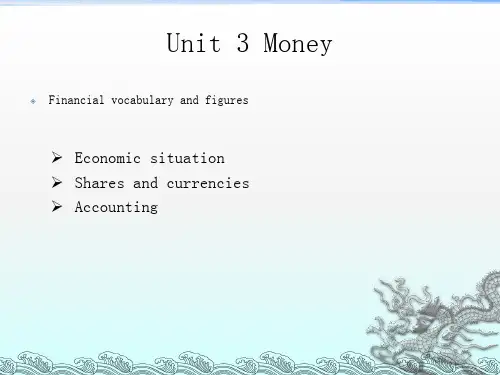
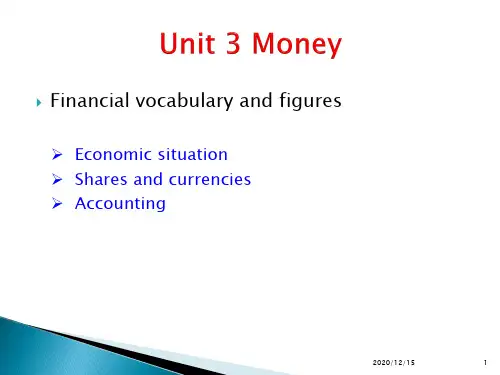

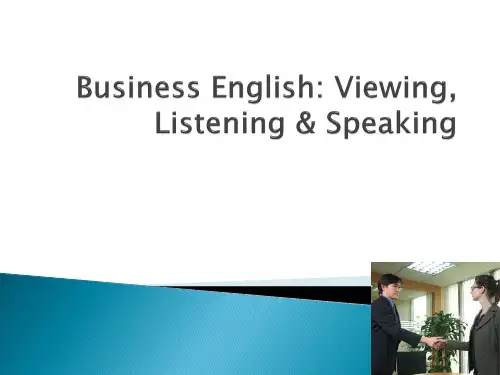
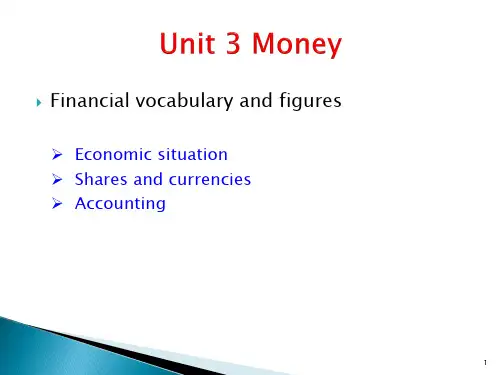
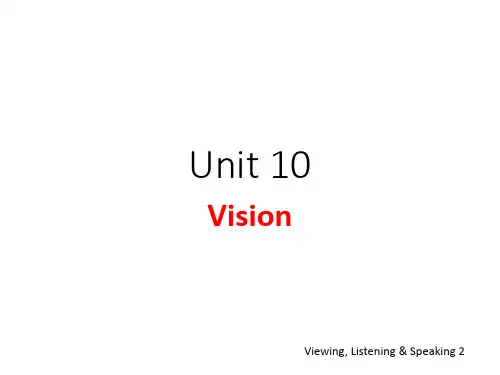
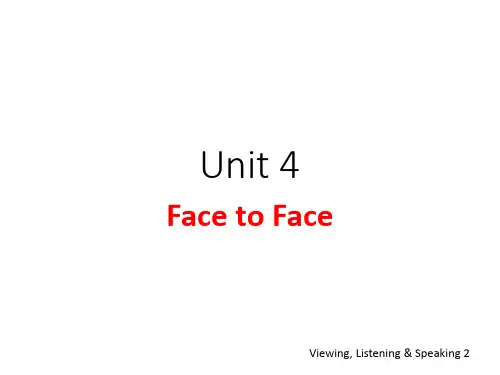
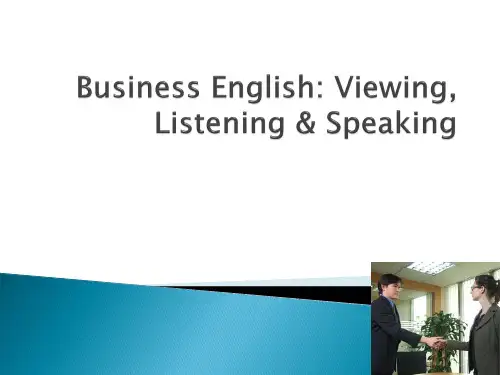
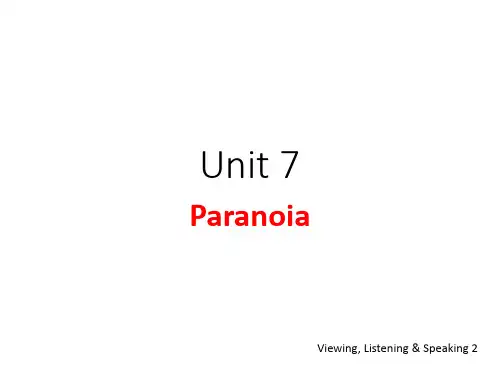
商务英语视听说单元 Revised by BETTY on December 25,2020商务英语视听说Unit 1Part I Listening and SpeakingTask 1Q1.I am graduating in June from ABC University and my major is hotel management. I am an outgoing, energetic person. I enjoy teamwork very much. As part of my degree program, I needed to finish different projects withmy teammates. I possess excellent interpersonal skills and a very positive attitude. My career aspiration is to become a successful hotelier. During my internship at the Grand Hyatt, I worked as a receptionist. My duties included offering friendly and efficient check-in and check-out service to guests, answering phone calls, taking and passing on messages to guests, I find that if I can make the guests happy, I will be very happy, too.Q2.I received honors in several school-wide English and computer contests. I enjoy working with people from different backgrounds. I am good at communicating, organizing and coordinating. If something blocks my path, I will look for a solution. I never give up easily.Sometimes I receive comments that I need to improve in the area of filing.I am now trying to improve by learning from others.Q3.Interest and career development are two of my criteria in choosing a job. Interest is the best motivation. I love the hotel business, so I will definitely devote myself to it. Moreover, high job satisfaction can be attained when the job is what I am interested in.Career development is very important for me when choosing a job. From what I know, Shangri-La provides equal career advancement for all staff. Thejob rotation plan and individually tailored training program are really exciting and helpful for young people like me.Task 2Is that your wife, Mr. Carter She is so beautiful.Avoid asking interviewer personal questions or making personal comments. Could you tell me how much the new job pays?The interviewer might infer from these questions that you are only interested in your own needs and not those of their company. Wait untilthe employer raises these subjects to discuss them.What about the paid holidays, insurance, and things like that?How much time will it take for me to be promoted here?But in which cities do you have your branches And where is your company basedIt is also unwise to ask about things you should have already known. Youare only telling the interviewer that you haven't done your homework.Part II Language FocusName: CaiNingPersonality: serious-minded; calm; humorous; easy-goingStrengths: the ability to work with all types of peopleWeakness: perfectionist; impatientWork experience: six years’ financial industry experience with severalcompanies; two years’ experience in an investment bankQualification: graduated from Peking University in 2001 majoring inaccounting; fluent English; bookkeepingand accounting proficiency inEnglish.Reasons for leaving last job: want to find a job that is challenging.Questions about the job: W ould I be able to work abroad in one of youroverseas branches?Part III Viewing and SpeakingVideo 1Reasons for joining the company It is one of the leading international consultant corporations which came to China after China entered in this company would give him the best chance to use what he has learned at university. Relevant work experience He was involved in a factory restoration in Nanjing.Questions Are there any opportunities for Chinese employees to betransferred to the head office in New York or other branch officesaround the world?Result of the interview Chen Bo will be notified of the final decision by Friday. Video 21. F T F F T2. 1) Sales Manager2) Five3) Brand Manager4) biscuits5) Business Administration6) oral EnglishIV Case AnalysisHint:She is not likely to get the job because she did poorly in the jobinterview.Things went wrong:1. Use filler words (“you know”) too many times.2. Bad-mouth former employer.3. Inappropriate answers to interviewer’s questions, eg, “I would ratherlike to establish my own compan y”4. Ask inappropriate questions, eg. “Can I take time off for vacation”5. Self-conceit — “I have no weakness”.6. Too much emphasis on travel.Scripts Unit 2Part I Listening and SpeakingTask 11) I haven’t seen you for years.2) What do you do now?3) I’m in the Research and Development Department.4) I knew you’d do something very challenging and creative.5) I sometimes stay in the office after work to deal with unfinished tasks.6) I am still the accountant of that cosmetics company.Task 21) personnel management2) developing markets3) planning4) execution5) sales targets6) team performance7) customer base8)customer satisfaction9)selecting, developing and managing10)cost-effective11)on time12)of good quality13) human and material resources14)training needs15)continuous improvementPart II Viewing and SpeakingVideo 1Clinton: financial accountsLucy White: data processingAdaBalck: management accounts2.Administration; Marketing; Engineering; Project Preparation; Accounting Video 21.self-employed entrepreneur, buyer, Line Supervisor, Advertising Executive, Public Relations Manager2.Names Likes DislikesJerome ?making a lot more money; having lots of independence in doing things feeling tired sometimesRobin having been to a lot of places too much traveling; having very little time tospend with his familyColin good salary and benefits noisy work environment; seldom having theopportunity to go outFrank new challenges; a lot of experience ?Janet ?meeting a lot of new & interesting people often having dinner parties in the evening; having little time with her family and babyUnit 3Part I Warm-up1) ensure smooth business communication2) the purpose of your call3) all the documents you’ll need4) schedule a specific time5) all distractions.6) confirm that you have understood each point.7) interruptions.8) strong accent.9) you sound polite and agreeable.10) the optional choice method,11) lengthy calls.12) smile while you are talking.Part II Listening and SpeakingTask 1F F TT F T F FTask 2 Leaving a messageMessage NoteTo: Louise PaulsonFrom: Paul JacksonPhone: 979-326-8965Message: Ring back to him about the order they placed last Friday. They have to make some changes to the order. It’s urgent.Taken by: RoyPart III Viewing & SpeakingVideo 11.F F T T F2. Message 1) Will you tell him that we’ve just received your sample of the new assembly coffee table and are quite happy with itMe ssage 2) Please tell Mr. Matthews we’re quite happy with the quality and design of the table, but the price is too high. We need some negotiation on it.Message 3) Please inform Mr. Matthews that I won’t be able to get to your company early on Saturday bec ause of the rail strike. I probably won’t arrive until that afternoon.Video 21.1)A 2)C 3)C 4)C 5)B 6)C?2.1)“Hold on, please. I’ll connect you.”2)“I’m afraid you’ve dialed the wrong extension.”3)“Oh, sorry to have interrupted you. Can you give me Henry Miller’s extension, please”4)“I’m very sorry, I didn’t notice that. I’ll put you through right now. Please wait a minute.”5)“It’s me again—Ms. Mandel. I’m still having trouble getting through to Henry Miller… Can you help”6)“Oh, I’m terribly sorry for the trouble.”Unit4Task 11Formal*Good afternoon, I’d like to call the meeting to order.* First of all, let’s discuss…2Informal?*OK, everyone is here…*So, why don’t we start with…3Informal* Right, you know why we are here.* Maybe we should do it like this…4Formal*Welcome to BCG, and to what I am sure will be the beginning of a major new alliance.* Today our purpose is to…5Informal*Right, let’s get down to business…* I suggest we deal with that…6Formal*Well, gentleman, it’s a pleasure to be here today…*I’d like to start with…Task 21) Arrive at the meeting ahead of schedule.2) Consider using a tape recorder.3) Use a consistent format.4) Follow the agenda.5) Be concise.6) List specific outcomes.7) After the meeting, write a meeting report from your notes.Part II Viewing & SpeakingVideo 1F FF T FVideo 21) To figure out the reason for the sales drop and the actions to be taken.2) The salespeople are not very motivated.3) No, because the sales quotas are pretty high.4) He proposes to lower the quotas.Unit 5Part I Listening and SpeakingTask 1C B B C ATask 21)daily routine in the office2)whether the visitor has an appointment or not3)greet the visitor4)the visitor’s name, title and position5)apologize and make some suggestions6)express regret and explain why7)date, time, name and the firm the visitor works for.8)considerate and warm9)keep the visitor fully informed of the situation.Part II Viewing and SpeakingVideo 11)George is travelling on business.2)He will stay for about a week.3)He has been invited to attend the trade fair by his business associates.4) His laptop computer is in the bag. It’s duty-free.5) No, good for personal use rather than commercial use are not subject to duty, and they are within the limit.Video 22. TUnit 6Part I Listening and SpeakingTask 11. we are hiring for2. business software and consulting services3. 4,0004. large corporations5. 90 million dollars6. pretty fast7. 298. a large project for a bankTask 2Company Profile1) Monica Li2) Manager of the PR Department of Oracle China3) enterprise software company in the world the first4) global software giant in China5) 19776) California7) 42,0008) 11 billion dollars9) 1989; set up Beijing Oracle Software Systems in10) 1991.11) Chengdu.12) education and support services.Part II Viewing and SpeakingVideo 1B A D E CVideo 2The things that Joan Copper does badlyShe doesn`t consider the audienceShe doesn`thave clear objectivesHer presentation isn`t well-preparedThere isn`t a clear structure (beginning, body, end)she doesn`t speak clearlyshe doesn`t speak at the right speedshe doesn`t maintain eye contact with the audienceshe doesn`t appear confident and positivethe visual aids aren`t clear and helpfulshe doesn`t use the equipment professionallyUnit 7Part I Listening and SpeakingTask 1120CM 130CM43KG 54KG 6KM/Hmovement controllerwill controlTask 2Small and elegantEasy to set up: all you need is a touch-tone phone ;as easy to use as making a normal telephone callFull-color motion video; adjustable picture setting; good audio quality; preview mode; privacy modeOn a special offerPart II Viewing and SpeakingTask 1service guaranteeTask 21.$2200 years for three years,$150/year after three years three weeks 24 hoursUnit 8Part I Listening and SpeakingTask 1flat up reached a peak down droppedTask 2The growth trend more than 37% the persistent high price RMB48 million accounted for % domestic routes RMB16869 million Part III Viewing and SpeakingVideo 1Tasksignificantlyby 50%to risefastVideo 2Task 1A B D F GTask 2turnoveroutput of washing machinesshare of refrigeratorsUnit 9and SpeakingTask 1F F T F F TTask 2new reputation world leaders laddies’s clubs 835 latest and SpeakingVideo 1TaskC B C A CVideo 2TaskA CB A BUnit 10and SpeakingTask 1sample trade terms scope of its business initiating the business negotiation processclassified general inquiries quotations for certain articles packing conditionsspecific inquiries regular customers generated representative Task 21)Steel screws in all sizes.2)Because the supplier is able to supply larger quantities at moreattractive prices.3)CIF.4)He looks forward to the supplier”s offer.and SpeakingVideo 1Taskrent to his guests quote around the corner a letter of credit $650010 percentage $7850 two to three weeksVideo 2TaskC A C B CUnit 11and SpeakingTask 1firm order acceptance terms and conditions terms of payment bind abide byterminate arbitrationTask2B C A Band SpeakingVideo 1have a problem with protects cost decorative European tastesLong-distance Sales Increase retailers LogoVideo 2Bran Gifts ZWS10A 1000 Cartons $18 XG7 bown box September 10, 2005Toronto 110% of the invoice value against all risks Confirmed, irrevocable 15th Quanlity and QantityUnit 12Listening and speakingTask 1:Bank transfer the beneficiary the paying instructions local bank when the size of payment is not attractive enoughthe shipping documents credit rating exporterTask 2:Applicant 1 beneficiary 8 2 4 opening bank 7confirming bankVideo 1task:A lump sum payment payment by installments cash and delivery advance payment final acceptance one month of the final deliveryVideo 2task:Australia SB-87654 US$50000 5 2 100 allowedJanuary beneficiary’s 15 daysUnit 13Listening and speakingTask 1:Competitive price get to the market marketing channels end users Lose outTask 2:Within 3 months after the contract is signed no in July in mid-JuneShipping space fully bookedVideo 1task:Part of our workshop 10 days a backing of orders full capacity Installed September 20th guarantee won’t be complete onward transportThe last possible dateVideo 2task:T F F T FUnit 14Listening and speakingTask 1:The insurance company or the shipping companyComplete and clear proof provided by competent investigating authorityBy making a refund and compensating for other direct losses or expenses, selling the goods at lower prices, or replacing the faulty goods.Task 2:Complaint 1:David brown 3a distributionAlmost 30%of the goods were damaged in one way or another withdraw payment until a solution has been worked out call him backComplaint 2:Mrs. McCall ACC company quality not the same as the samples send the whole lot back 0 5:30Video 1task:Lodged a claim 15 sets were badly damaged rough handling by the shipping company take the matter up with them in good condition careless handling at some stage prior to shipment survey report replace all 15 sets as soon as possible settle your claim immediately your cooperationVideo 2task:Because 15 cases of goods they received were badly damaged.Because the damage was due to rough handling in transit and the contract is based on FOB.To turn to the insurance company for compensation.Unit 15and SpeakingTask 1The company’s detailed marketing strategy potential new markets the company’s productspromotional programs advertising campaigns exhibitionsestablishing closer contacts with consumers increasing sales publicity programscustomers’ support raise public awareness of the company the company’s sales programstraining programs how to improve their sales performance monitor the market shareTask 2any demand any competition Testing selected customers if they like it or notsmaller parts in which part or segment you’re going to sell your product Advertisingtarget customers budgetand SpeakingVideo 1Task 1Potential market competition sales-profit analysis advertising marketing strategyTask 26 percent radio and TV the Net fashion magazinesVideo 2TaskNo.How many staff members do you have?In a small canteen.Are they happy with the food served in the canteen?Because of a limited selection of dishes.Unit 16Slogan B Slogan F Slogan D Slogan A Slogan C Slogan Eand SpeakingTask 1A C BTask2Influence consumers to buy a reminder to consumersan innovation by altering the perceptions of consumersand SpeakingVideo 1C B A C AVideo 2It reaches the target market through the right media at right time. It is made to the tastes of the target customers.It tells an interesting and shocking story.It draws the audience’s immediate response.。
商务英语视听说Unit 1Part I Listening and SpeakingTask 1Q1.I am graduating in June from ABC University and my major is hotel management. I am an outgoing, energetic person. I enjoy teamwork very much. As part of my degree program, I needed to finish different projects with my teammates. I possess excellent interpersonal skills and a very positive attitude. My career aspiration is to become a successful hotelier. During my internship at the Grand Hyatt, I worked as a receptionist. My duties included offering friendly and efficient check-in and check-out service to guests, answering phone calls, taking and passing on messages to guests, I find that if I can make the guests happy, I will be very happy, too.Q2.I received honors in several school-wide English and computer contests. I enjoy working with people from different backgrounds. I am good at communicating, organizing and coordinating. If something blocks my path, I will look for a solution. I never give up easily. Sometimes I receive comments that I need to improve in the area of filing. I am now trying to improve by learning from others.Q3.Interest and career development are two of my criteria in choosing a job. Interest is the best motivation. I love the hotel business, so I will definitely devote myself to it. Moreover, high job satisfaction can be attained when the job is what I am interested in.Career development is very important for me when choosing a job. From what I know, Shangri-La provides equal career advancement for all staff. The job rotation plan and individually tailored training program are really exciting and helpful for young people like me.Task 2Is that your wife, Mr. Carter She is so beautiful.Avoid asking interviewer personal questions or making personal comments.Could you tell me how much the new job paysThe interviewer might infer from these questions that you are only interested in your own needs and not those of their company. Wait until the employer raises these subjects to discuss them.What about the paid holidays, insurance, and things like thatHow much time will it take for me to be promoted hereBut in which cities do you have your branches And where is your company basedIt is also unwise to ask about things you should have already known. You are only telling the interviewer that you haven't done your homework.Part II Language FocusName: CaiNingPersonality: serious-minded; calm; humorous; easy-goingStrengths: the ability to work with all types of peopleWeakness: perfectionist; impatientWork experience: si x years’ financial industry experience with several companies; two years’ experience in an investment bankQualification: graduated from Peking University in 2001 majoring in accounting; fluentEnglish; bookkeepingand accounting proficiency in English.Reasons for leaving last job: want to find a job that is challenging.Questions about the job: W ould I be able to work abroad in one of your overseas branchesPart III Viewing and SpeakingVideo 1Reasons for joining the company It is one of the leading international consultant corporations which came to Chinaafter China entered WTO.Working in this company would give him the bestchance to use what he has learned at university.Relevant work experience He was involved in a factory restoration in Nanjing.Questions Are there any opportunities for Chinese employees to be transferred to the headoffice in New York or other branch offices around the worldResult of the interview Chen Bo will be notified of the final decision by Friday.Video 21. F T F F T2. 1) Sales Manager2) Five3) Brand Manager4) biscuits5) Business Administration6) oral EnglishIV Case AnalysisHint:She is not likely to get the job because she did poorly in the job interview.Things went wrong:1. Use filler words (“you know”) too many times.2. Bad-mouth former employer.3. Inappropriate answers to interviewer’s questions, eg, “I would rather like to establish myown company”4. Ask inappropriate questions, eg. “Can I take time off for vacation”5. Self-conceit—“I have no weakness”.6. Too much emphasis on travel.Scripts Unit 2Part I Listening and SpeakingTask 11) I haven’t seen you for years.2) What do you do now3) I’m in the Research and Development Department.4) I knew you’d do something very challenging and creative.5) I sometimes stay in the office after work to deal with unfinished tasks.6) I am still the accountant of that cosmetics company.Task 21) personnel management2) developing markets3) planning4) execution5) sales targets6) team performance7) customer base8)customer satisfaction9)selecting, developing and managing10)cost-effective11)on time12)of good quality13) human and material resources14)training needs15)continuous improvementPart II Viewing and SpeakingVideo 11.Caroline Clinton: financial accountsLucy White: data processingAdaBalck: management accounts2.Administration; Marketing; Engineering; Project Preparation; AccountingVideo 21.self-employed entrepreneur, buyer, Line Supervisor, Advertising Executive, Public Relations Manager2.Names Likes DislikesJerome making a lot more money; having lots of independence in doing things feeling tired sometimesRobin having been to a lot of places too much traveling; having very little time to spend with his familyColin good salary and benefits noisy work environment; seldom having the opportunity to go outFrank new challenges; a lot of experienceJanet meeting a lot of new & interesting people often having dinner parties in the evening; having little time with her family and babyUnit 3Part I Warm-up1) ensure smooth business communication2) the purpose of your call3) all the documents you’ll need4) schedule a specific time5) all distractions.6) confirm that you have understood each point.7) interruptions.8) strong accent.9) you sound polite and agreeable.10) the optional choice method,11) lengthy calls.12) smile while you are talking.Part II Listening and SpeakingTask 1F F TT F T F FTask 2 Leaving a messageMessage NoteTo: Louise PaulsonFrom: Paul JacksonPhone: 979-326-8965Message: Ring back to him about the order they placed last Friday. They have to make some changes to the order. It’s urgent.Taken by: RoyPart III Viewing & SpeakingVideo 11.F F T T F2. Message 1) Will you tell him that we’ve just received your sample of the new assembly coffee table and are quite happy with itMessage 2) Please tell Mr. Matthews we’re quite happy with the quality and design of the table, but the price is too high. We need some negotiation on it.Message 3) Please inform Mr. Matthews that I won’t be able to get to your company early on Saturday because of the rail strike. I probably won’t arrive until that afternoon.Video 21.1)A 2)C 3)C 4)C 5)B 6)C2.1)“Hold on, please. I’ll connect you.”2)“I’m afraid you’ve dialed the wrong extension.”3)“Oh, sorry to have interrupted you. Can you give me Henry Miller’s extension, please”4)“I’m very sorry, I didn’t notice that. I’ll put you through right now. Please wait a minute.”5)“It’s me again—Ms. Mandel. I’m still having trouble getting through to Henry Miller… Can you help”6)“Oh, I’m terribly sorry for the trouble.”Unit4Task 11Formal*Good afternoon, I’d like to call the meeting to order.* First of all, let’s discuss…2Informal*OK, everyone is here…*So, why don’t we start with…3Informal* Right, you know why we are here.* Maybe we should do it like this…4Formal*Welcome to BCG, and to what I am sure will be the beginning of a major new alliance. * Today our purpose is to…5Informal*Right, let’s get down to business…* I suggest we deal with that…6Formal*Well, gentleman, it’s a pleasure to be here today…*I’d like to start with…Task 21) Arrive at the meeting ahead of schedule.2) Consider using a tape recorder.3) Use a consistent format.4) Follow the agenda.5) Be concise.6) List specific outcomes.7) After the meeting, write a meeting report from your notes.Part II Viewing & SpeakingVideo 1F FF T FVideo 21) To figure out the reason for the sales drop and the actions to be taken.2) The salespeople are not very motivated.3) No, because the sales quotas are pretty high.4) He proposes to lower the quotas.Unit 5Part I Listening and SpeakingTask 1C B B C ATask 21)daily routine in the office2)whether the visitor has an appointment or not3)greet the visitor4)the visitor’s name, title and position5)apologize and make some suggestions6)express regret and explain why7)date, time, name and the firm the visitor works for.8)considerate and warm9)keep the visitor fully informed of the situation.Part II Viewing and SpeakingVideo 11)George is travelling on business.2)He will stay for about a week.3)He has been invited to attend the trade fair by his business associates.4) His laptop computer is in the bag. It’s duty-free.5) No, good for personal use rather than commercial use are not subject to duty, and they are within the limit.Video 21.F2. T3.F4.F5.F6.F7.T8.F9.T 10.FUnit 6Part I Listening and SpeakingTask 11. we are hiring for2. business software and consulting services3. 4,0004. large corporations5. 90 million dollars6. pretty fast7. 298. a large project for a bankTask 2Company Profile1) Monica Li2) Manager of the PR Department of Oracle China3) enterprise software company in the world the first4) global software giant in China5) 19776) California7) 42,0008) 11 billion dollars9) 1989; set up Beijing Oracle Software Systems Co.Ltd in10) 1991.11) Chengdu.12) education and support services.Part II Viewing and SpeakingVideo 1B A D E CVideo 2The things that Joan Copper does badlyShe doesn`t consider the audienceShe doesn`thave clear objectivesHer presentation isn`t well-preparedThere isn`t a clear structure (beginning, body, end)she doesn`t speak clearlyshe doesn`t speak at the right speedshe doesn`t maintain eye contact with the audienceshe doesn`t appear confident and positivethe visual aids aren`t clear and helpfulshe doesn`t use the equipment professionallyUnit 7Part I Listening and SpeakingTask 1120CM 130CM43KG 54KG 6KM/H1.smaller2.people-friendly3.arm movement4.heavier5.its controller6.at will7.total control8.turnTask 2Small and elegantEasy to set up: all you need is a touch-tone phone ;as easy to use as making a normal telephone callFull-color motion video; adjustable picture setting; good audio quality; preview mode; privacy modeOn a special offerPart II Viewing and SpeakingTask 11.Price2.discount3.after-sales service 3.money-back guarantee4.delivery5.warranty Task 21.$22002.three years3.224.205.free for three years,$150/year after three years6.within three weeks7.within 24 hoursUnit 8Part I Listening and SpeakingTask 11.remained flat2.went up3.rose reached a peak4.up down droppedTask 2The growth trend m ore than 37% the persistent high price RMB48 million accounted for40.6% domestic routes RMB16869 millionPart III Viewing and SpeakingVideo 1Task1.increased significantly2.opened3.dropped by 50%4.continues to rise5.grows fast6.developedVideo 2Task 1A B D F GTask 21.annual turnover2.profit3.total output of washing machines4.market share of refrigeratorsUnit 91.Listening and SpeakingTask 1F F T F F TTask 2new reputation world leaders laddies’s clubs 835 latest2.Viewing and SpeakingVideo 1TaskC B C A CVideo 2TaskA CB A BUnit 101.Listening and SpeakingTask 1sample trade terms scope of its business initiating the business negotiation process classified general inquiries quotations for certain articles packing conditions specific inquiries regular customers generated representativeTask 21)Steel screws in all sizes.2)Because the supplier is able to supply larger quantities at more attractive prices.3)CIF.4)He looks forward to the supplier”s offer.2.Viewing and SpeakingVideo 1Taskrent to his guests quote around the corner a letter of credit $650010 percentage $7850 two to three weeksVideo 2TaskC A C B CUnit 111.Listening and SpeakingTask 1firm order acceptance terms and conditions terms of payment bind abide byterminate arbitrationTask2B C A B2.Viewing and SpeakingVideo 1have a problem with protects cost decorative European tastes Long-distance Sales Increase retailers LogoVideo 2Bran Gifts ZWS10A 1000 Cartons $18 XG7 bown box September 10, 2005Toronto 110% of the invoice value against all risks Confirmed, irrevocable 15th Quanlity and QantityUnit 12Listening and speakingTask 1:Bank transfer the beneficiary the paying instructions local bankwhen the size of payment is not attractive enoughthe shipping documents credit rating exporterTask 2:Applicant 1 beneficiary 8 2 4 opening bank 7confirming bankVideo 1task:A lump sum payment payment by installments cash and delivery advance payment final acceptance one month of the final deliveryVideo 2task:Australia SB-87654 US$50000 5 2 100 allowedJanuary 18.2006 beneficiary’s 15 daysUnit 13Listening and speakingTask 1:Competitive price get to the market marketing channels end usersLose outTask 2:Within 3 months after the contract is signed no in July in mid-June Shipping space fully bookedVideo 1task:Part of our workshop 10 days a backing of orders full capacityInstalled September 20th guarantee won’t be complete onward transport The last possible dateVideo 2task:T F F T FUnit 14Listening and speakingTask 1:The insurance company or the shipping companyComplete and clear proof provided by competent investigating authorityBy making a refund and compensating for other direct losses or expenses, selling the goods at lower prices, or replacing the faulty goods.Task 2:Complaint 1:David brown 3a distributionAlmost 30%of the goods were damaged in one way or another withdraw payment until a solution has been worked out call him backComplaint 2:Mrs. McCall ACC company quality not the same as the samples send the whole lot back 0181-993-421 5:30Video 1task:Lodged a claim 15 sets were badly damaged rough handling by the shipping company take the matter up with them in good condition careless handling at some stage prior to shipment survey report replace all 15 sets as soon as possible settle your claim immediately your cooperationVideo 2task:Because 15 cases of goods they received were badly damaged.Because the damage was due to rough handling in transit and the contract is based on FOB. To turn to the insurance company for compensation.Unit 151.Listening and SpeakingTask 1The company’s detailed marketing strategy potential new markets the company’s productspromotional programs advertising campaigns exhibitionsestablishing closer contacts with consumers increasing sales publicity programs customers’ support raise public awareness of the company the company’s sales programstraining programs how to improve their sales performance monitor the market share Task 2any demand any competition Testing selected customers if they like it or not smaller parts in which part or segment you’re going to sell your product Advertising target customers budget2.Viewing and SpeakingVideo 1Task 1Potential market competition sales-profit analysis advertising marketing strategy Task 26 percent radio and TV the Net fashion magazinesVideo 2TaskNo.How many staff members do you haveIn a small canteen.Are they happy with the food served in the canteenBecause of a limited selection of dishes.Unit 161.Warm-upSlogan B Slogan F Slogan D Slogan A Slogan C Slogan E 2.Listening and SpeakingTask 1A C BTask2Influence consumers to buy a reminder to consumersan innovation by altering the perceptions of consumers3.Viewing and SpeakingVideo 1C B A C AVideo 2It reaches the target market through the right media at right time.It is made to the tastes of the target customers.It tells an interesting and shocking story.It draws the audience’s immediate response.。
商务英语视听说Unit 1Part I Listening and SpeakingTask 1Q1.I am graduating in June from ABC University and my major is hotel management. I am an outgoing, energetic person. I enjoy teamwork very much. As part of my degree program, I needed to finish different projects with my teammates. I possess excellent interpersonal skills and a very positive attitude. My career aspiration is to become a successful hotelier. During my internship at the Grand Hyatt, I worked as a receptionist. My duties included offering friendly and efficient check-in and check-out service to guests, answering phone calls, taking and passing on messages to guests, I find that if I can make the guests happy, I will be very happy, too.Q2.I received honors in several school-wide English and computer contests. I enjoy working with people from different backgrounds. I am good at communicating, organizing and coordinating. If something blocks my path, I will look for a solution. I never give up easily.Sometimes I receive comments that I need to improve in the area of filing. I am now trying to improve by learning from others.Q3.Interest and career development are two of my criteria in choosing a job. Interest is the best motivation. I love the hotel business, so I will definitely devote myself to it. Moreover, high job satisfaction can be attained when the job is what I am interested in.Career development is very important for me when choosing a job. From what I know, Shangri-La provides equal career advancement for all staff. The job rotation plan and individually tailored training program are really exciting and helpful for young people like me.Task 2Is that your wife, Mr. Carter? She is so beautiful.Avoid asking interviewer personal questions or making personal comments.Could you tell me how much the new job pays?The interviewer might infer from these questions that you are only interested in your own needs and not those of their company. Wait until the employer raises these subjects to discuss them. What about the paid holidays, insurance, and things like that?How much time will it take for me to be promoted here?But in which cities do you have your branches? And where is your company based?It is also unwise to ask about things you should have already known. You are only telling the interviewer that you haven't done your homework.Part II Language FocusName: CaiNingPersonality: serious-minded; calm; humorous; easy-goingStrengths: the ability to work with all types of peopleWeakness: perfectionist; impatientWork experience: six years’ financial industry experience with several companies; two years’experience in an investment bankQualification: graduated from Peking University in 2001 majoring in accounting; fluent English; bookkeepingand accounting proficiency in English.Reasons for leaving last job: want to find a job that is challenging.Questions about the job: W ould I be able to work abroad in one of your overseas branches?Part III Viewing and SpeakingVideo 1Reasons for joining the company It is one of the leading international consultant corporations which came to Chinaafter China entered WTO.Working in this company would give him the bestchance to use what he has learned at university.Relevant work experience He was involved in a factory restoration in Nanjing.Questions Are there any opportunities for Chinese employees to be transferred to the headoffice in New York or other branch offices around the world?Result of the interview Chen Bo will be notified of the final decision by Friday.Video 21. F T F F T2. 1) Sales Manager2) Five3) Brand Manager4) biscuits5) Business Administration6) oral EnglishIV Case AnalysisHint:She is not likely to get the job because she did poorly in the job interview.Things went wrong:1. Use filler words (“you know”) too many times.2. Bad-mouth former employer.3. Inappropriate answers to interviewer’s questions, eg, “I would rather like to establish my owncompany”4. Ask inappropriate questions, eg. “Can I take time off for vacation?”5. Self-conceit—“I have no weakness”.6. Too much emphasis on travel.Scripts Unit 2Part I Listening and SpeakingTask 11) I haven’t seen you for years.2) What do you do now?3) I’m i n the Research and Development Department.4) I knew you’d do something very challenging and creative.5) I sometimes stay in the office after work to deal with unfinished tasks.6) I am still the accountant of that cosmetics company.Task 21) personnel management2) developing markets3) planning4) execution5) sales targets6) team performance7) customer base8)customer satisfaction9)selecting, developing and managing10)cost-effective11)on time12)of good quality13) human and material resources14)training needs15)continuous improvementPart II Viewing and SpeakingVideo 11.Caroline Clinton: financial accountsLucy White: data processingAdaBalck: management accounts2. Administration; Marketing; Engineering; Project Preparation; AccountingVideo 21. self-employed entrepreneur, buyer, Line Supervisor, Advertising Executive, Public Relations Manager2.Names Likes DislikesJerome making a lot more money; having lots of independence in doing things feeling tired sometimesRobin having been to a lot of places too much traveling; having very little time tospend with his familyColin good salary and benefits noisy work environment; seldom having theopportunity to go outFrank new challenges; a lot of experienceJanet meeting a lot of new & interesting people often having dinner parties in the evening; having little time with her family and babyUnit 3Part I Warm-up1) ensure smooth business communication2) the purpose of your call3) all the documents you’ll need4) schedule a specific time5) all distractions.6) confirm that you have understood each point.7) interruptions.8) strong accent.9) you sound polite and agreeable.10) the optional choice method,11) lengthy calls.12) smile while you are talking.Part II Listening and SpeakingTask 1F F TT F T F FTask 2 Leaving a messageMessage NoteTo: Louise PaulsonFrom: Paul JacksonPhone: 979-326-8965Message: Ring back to him about the order they placed last Friday. They have to make some changes to the order. It’s urgent.Taken by: RoyPart III Viewing & SpeakingVideo 11. F F T T F2. Message 1) Will you tell him that we’ve just received your sample of the new assembly coffee table and are quite happy with it?Message 2) Please t ell Mr. Matthews we’re quite happy with the quality and design of the table, but the price is too high. We need some negotiation on it.Message 3) Please inform Mr. Matthews that I won’t be able to get to your company early on Saturday because of the rail strike. I probably won’t arrive until that afternoon.Video 21.1)A 2)C 3)C 4)C 5)B 6)C2.1)“Hold on, please. I’ll connect you.”2)“I’m afraid you’ve dialed the wrong extension.”3)“Oh, sorry to have interrupted you. Can you give me Henry Miller’s extension, please?”4)“I’m very sorry, I didn’t notice that. I’ll put you through right now. Please wait a minute.”5)“It’s me again—Ms. Mandel. I’m still having trouble getting through to Henry Miller… Can you help?”6)“Oh, I’m terribly sorry for the trouble.”Unit4Task 11Formal*Good afternoon, I’d like to call the meeting to order.* First of all, let’s discuss…2Informal*OK, everyone is here…*So, why don’t we start with…3Informal* Right, you know why we are here.* Maybe we should do it like this…4Formal*Welcome to BCG, and to what I am sure will be the beginning of a major new alliance. * Today our purpose is to…5Informal*Right, let’s get down to business…* I suggest we deal with that…6Formal*Well, gentleman, it’s a pleasure to be here today…*I’d like to start with…Task 21) Arrive at the meeting ahead of schedule.2) Consider using a tape recorder.3) Use a consistent format.4) Follow the agenda.5) Be concise.6) List specific outcomes.7) After the meeting, write a meeting report from your notes.Part II Viewing & SpeakingVideo 1F FF T FVideo 21) To figure out the reason for the sales drop and the actions to be taken.2) The salespeople are not very motivated.3) No, because the sales quotas are pretty high.4) He proposes to lower the quotas.Part I Listening and SpeakingTask 1C B B C ATask 21)daily routine in the office2)whether the visitor has an appointment or not3)greet the visitor4)the visitor’s name, title and position5)apologize and make some suggestions6)express regret and explain why7)date, time, name and the firm the visitor works for.8)considerate and warm9)keep the visitor fully informed of the situation.Part II Viewing and SpeakingVideo 11)George is travelling on business.2)He will stay for about a week.3)He has been invited to attend the trade fair by his business associates.4) His laptop computer is in the bag. It’s duty-free.5) No, good for personal use rather than commercial use are not subject to duty, and they are within the limit.Video 21.F2. T3.F4.F5.F6.F7.T8.F9.T 10.FUnit 6Part I Listening and SpeakingTask 11. we are hiring for2. business software and consulting services3. 4,0004. large corporations5. 90 million dollars6. pretty fast7. 298. a large project for a bankTask 2Company Profile1) Monica Li2) Manager of the PR Department of Oracle China3) enterprise software company in the world the first4) global software giant in China6) California7) 42,0008) 11 billion dollars9) 1989; set up Beijing Oracle Software Systems Co.Ltd in10) 1991.11) Chengdu.12) education and support services.Part II Viewing and SpeakingVideo 1B A D E CVideo 2The things that Joan Copper does badlyShe doesn`t consider the audienceShe doesn`thave clear objectivesHer presentation isn`t well-preparedThere isn`t a clear structure (beginning, body, end)she doesn`t speak clearlyshe doesn`t speak at the right speedshe doesn`t maintain eye contact with the audienceshe doesn`t appear confident and positivethe visual aids aren`t clear and helpfulshe doesn`t use the equipment professionallyUnit 7Part I Listening and SpeakingTask 1120CM 130CM43KG 54KG 6KM/H1.smaller2.people-friendly3.arm movement4.heavier5.its controller6.at will7.total control8.turnTask 2Small and elegantEasy to set up: all you need is a touch-tone phone ;as easy to use as making a normal telephone callFull-color motion video; adjustable picture setting; good audio quality; preview mode; privacy modeOn a special offerPart II Viewing and SpeakingTask 11.Price2.discount3.after-sales service 3.money-back guarantee4.delivery5.warrantyTask 21.$22002.three years3.224.205.free for three years,$150/year after three years6.within three weeks7.within 24 hoursPart I Listening and SpeakingTask 11.remained flat2.went up3.rose reached a peak4.up down droppedTask 2The growth trend more than 37% the persistent high price RMB48 million accounted for40.6% domestic routes RMB16869 millionPart III Viewing and SpeakingVideo 1Task1.increased significantly2.opened3.dropped by 50%4.continues to rise5.grows fast6.developedVideo 2Task 1A B D F GTask 21.annual turnover2.profit3.total output of washing machines4.market share of refrigeratorsUnit 91.Listening and SpeakingTask 1F F T F F TTask 2new reputation world leaders laddies’s clubs 835 latest2.Viewing and SpeakingVideo 1TaskC B C A CVideo 2TaskA CB A BUnit 101.Listening and SpeakingTask 1sample trade terms scope of its business initiating the business negotiation processclassified general inquiries quotations for certain articles packing conditionsspecific inquiries regular customers generated representativeTask 21)Steel screws in all sizes.2)Because the supplier is able to supply larger quantities at more attractive prices.3)CIF.4)He looks forward to the supplier”s offer.2.Viewing and SpeakingVideo 1Taskrent to his guests quote around the corner a letter of credit $650010 percentage $7850 two to three weeksVideo 2TaskC A C B CUnit 111.Listening and SpeakingTask 1firm order acceptance terms and conditions terms of payment bind abide by terminate arbitrationTask2B C A B2.Viewing and SpeakingVideo 1have a problem with protects cost decorative European tastes Long-distance Sales Increase retailers LogoVideo 2Bran Gifts ZWS10A 1000 Cartons $18 XG7 bown box September 10, 2005 Toronto 110% of the invoice value against all risks Confirmed, irrevocable 15th Quanlity and QantityUnit 12Listening and speakingTask 1:Bank transfer the beneficiary the paying instructions local bankwhen the size of payment is not attractive enoughthe shipping documents credit rating exporterTask 2:Applicant 1 beneficiary 8 2 4 opening bank 7confirming bankVideo 1task:A lump sum payment payment by installments cash and delivery advance paymentfinal acceptance one month of the final deliveryVideo 2task:Australia SB-87654 US$50000 5 2 100 allowedJanuary 18.2006 beneficiary’s 15 daysUnit 13Listening and speakingTask 1:Competitive price get to the market marketing channels end usersLose outTask 2:Within 3 months after the contract is signed no in July in mid-JuneShipping space fully bookedVideo 1task:Part of our workshop 10 days a backing of orders full capacityInstalled September 20th guarantee won’t be complete onward transportThe last possible dateVideo 2task:T F F T FUnit 14Listening and speakingTask 1:The insurance company or the shipping companyComplete and clear proof provided by competent investigating authorityBy making a refund and compensating for other direct losses or expenses, selling the goods at lower prices, or replacing the faulty goods.Task 2:Complaint 1:David brown 3a distributionAlmost 30%of the goods were damaged in one way or another withdraw payment until a solution has been worked out call him backComplaint 2:Mrs. McCall ACC company quality not the same as the samples send the whole lot back 0181-993-421 5:30Video 1task:Lodged a claim 15 sets were badly damaged rough handling by the shipping company take the matter up with them in good condition careless handling at some stage prior to shipment survey report replace all 15 sets as soon as possible settle your claim immediately your cooperationtask:Because 15 cases of goods they received were badly damaged.Because the damage was due to rough handling in transit and the contract is based on FOB.To turn to the insurance company for compensation.Unit 151.Listening and SpeakingTask 1The company’s detailed marketing strategy potential new markets the company’s products promotional programs advertising campaigns exhibitionsestablishing closer contacts with consumers increasing sales publicity programs customers’ support raise public awareness of the company the company’s sales programs training programs how to improve their sales performance monitor the market share Task 2any demand any competition Testing selected customers if they like it or not smaller parts in which part or segment you’re going to sell your product Advertising target customers budget2.Viewing and SpeakingVideo 1Task 1Potential market competition sales-profit analysis advertising marketing strategy Task 2market share entry of new competitors young people $1800000 $180000006 percent radio and TV the Net fashion magazinesVideo 2TaskNo.How many staff members do you have?In a small canteen.Are they happy with the food served in the canteen?Because of a limited selection of dishes.Unit 161.Warm-upSlogan B Slogan F Slogan D Slogan A Slogan C Slogan E2.Listening and SpeakingTask 1A C BTask2Influence consumers to buy a reminder to consumersan innovation by altering the perceptions of consumers3.Viewing and SpeakingVideo 1Video 2It reaches the target market through the right media at right time. It is made to the tastes of the target customers.It tells an interesting and shocking story.It draws the audience’s immediate response.。
商务英语视听说Unit 1Part I Listening and SpeakingTask 1Q1.I am graduating in June from ABC University and my major is hotel management. I am an outgoing, energetic person. I enjoy teamwork very much. As part of my degree program, I needed to finish different projects with my teammates. I possess excellent interpersonal skills and a very positive attitude. My career aspiration is to become a successful hotelier. During my internship at the Grand Hyatt, I worked as a receptionist. My duties included offering friendly and efficient check-in and check-out service to guests, answering phone calls, taking and passing on messages to guests, I find that if I can make the guests happy, I will be very happy, too.Q2.I received honors in several school-wide English and computer contests. I enjoy working with people from different backgrounds. I am good at communicating, organizing and coordinating. If something blocks my path, I will look for a solution. I never give up easily.Sometimes I receive comments that I need to improve in the area of filing. I am now trying to improve by learning from others.Q3.Interest and career development are two of my criteria in choosing a job. Interest is the best motivation. I love the hotel business, so I will definitely devote myself to it. Moreover, high job satisfaction can be attained when the job is what I am interested in.Career development is very important for me when choosing a job. From what I know, Shangri-La provides equal career advancement for all staff. The job rotation plan and individually tailored training program are really exciting and helpful for young people like me.Task 2Is that your wife, Mr. Carter? She is so beautiful.Avoid asking interviewer personal questions or making personal comments.Could you tell me how much the new job pays?The interviewer might infer from these questions that you are only interested in your own needs and not those of their company. Wait until the employer raises these subjects to discuss them. What about the paid holidays, insurance, and things like that?How much time will it take for me to be promoted here?But in which cities do you have your branches? And where is your company based?It is also unwise to ask about things you should have already known. You are only telling the interviewer that you haven't done your homework.Part II Language FocusName: CaiNingPersonality: serious-minded; calm; humorous; easy-goingStrengths: the ability to work with all types of peopleWeakness: perfectionist; impatientWork experience: six years’ financial industry experience with several companies; two years’experience in an investment bankQualification: graduated from Peking University in 2001 majoring in accounting; fluent English; bookkeepingand accounting proficiency in English.Reasons for leaving last job: want to find a job that is challenging.Questions about the job: W ould I be able to work abroad in one of your overseas branches?Part III Viewing and SpeakingVideo 1Reasons for joining the company It is one of the leading international consultant corporations which came to Chinaafter China entered WTO.Working in this company would give him the bestchance to use what he has learned at university.Relevant work experience He was involved in a factory restoration in Nanjing.Questions Are there any opportunities for Chinese employees to be transferred to the headoffice in New York or other branch offices around the world?Result of the interview Chen Bo will be notified of the final decision by Friday.Video 21. F T F F T2. 1) Sales Manager2) Five3) Brand Manager4) biscuits5) Business Administration6) oral EnglishIV Case AnalysisHint:She is not likely to get the job because she did poorly in the job interview.Things went wrong:1. Use filler words (“you know”) too many times.2. Bad-mouth former employer.3. Inappropriate answers to interviewer’s questions, eg, “I would rather like to establish my owncompany”4. Ask inappropriate q uestions, eg. “Can I take time off for vacation?”5. Self-conceit—“I have no weakness”.6. Too much emphasis on travel.Scripts Unit 2Part I Listening and SpeakingTask 11) I haven’t seen you for years.2) What do you do now?3) I’m in the Research a nd Development Department.4) I knew you’d do something very challenging and creative.5) I sometimes stay in the office after work to deal with unfinished tasks.6) I am still the accountant of that cosmetics company.Task 21) personnel management2) developing markets3) planning4) execution5) sales targets6) team performance7) customer base8)customer satisfaction9)selecting, developing and managing10)cost-effective11)on time12)of good quality13) human and material resources14)training needs15)continuous improvementPart II Viewing and SpeakingVideo 11.Caroline Clinton: financial accountsLucy White: data processingAdaBalck: management accounts2. Administration; Marketing; Engineering; Project Preparation; AccountingVideo 21. self-employed entrepreneur, buyer, Line Supervisor, Advertising Executive, Public Relations Manager2.Names Likes DislikesJerome making a lot more money; having lots of independence in doing things feeling tired sometimesRobin having been to a lot of places too much traveling; having very little time tospend with his familyColin good salary and benefits noisy work environment; seldom having theopportunity to go outFrank new challenges; a lot of experienceJanet meeting a lot of new & interesting people often having dinner parties in the evening; having little time with her family and babyUnit 3Part I Warm-up1) ensure smooth business communication2) the purpose of your call3) all the documents you’ll need4) schedule a specific time5) all distractions.6) confirm that you have understood each point.7) interruptions.8) strong accent.9) you sound polite and agreeable.10) the optional choice method,11) lengthy calls.12) smile while you are talking.Part II Listening and SpeakingTask 1F F TT F T F FTask 2 Leaving a messageMessage NoteTo: Louise PaulsonFrom: Paul JacksonPhone: 979-326-8965Message: Ring back to him about the order they placed last Friday. They have to make some changes to the order. It’s urgent.Taken by: RoyPart III Viewing & SpeakingVideo 11. F F T T F2. Message 1) Will you tell him that we’ve just received your sample of the new assembly coffee table and are quite happy with it?Message 2) Please tell Mr. Matthews we’re quite happy with the quality and design of the table, but the price is too high. We need some negotiation on it.Message 3) Please inform Mr. Matthews that I won’t be able to get to your company early on Saturday because of the rail strike. I probably w on’t arrive until that afternoon.Video 21.1)A 2)C 3)C 4)C 5)B 6)C2.1)“Hold on, please. I’ll connect you.”2)“I’m afraid you’ve dialed the wrong extension.”3)“Oh, sorry to have interrupted you. Can you give me Henry Miller’s extension, please?”4)“I’m very sorry, I didn’t notice that. I’ll put you through right now. Please wait a minute.”5)“It’s me again—Ms. Mandel. I’m still having trouble getting through to Henry Miller… Can youhelp?”6)“Oh, I’m terribly sorry for the trouble.”Unit4Task 11Formal*Good afternoon, I’d like to call the meeting to order.* First of all, let’s discuss…2Informal*OK, everyone is here…*So, why don’t we start with…3Informal* Right, you know why we are here.* Maybe we should do it like this…4Formal*Welcome to BCG, and to what I am sure will be the beginning of a major new alliance. * Today our purpose is to…5Informal*Right, let’s get down to business…* I suggest we deal with that…6Formal*Well, gentleman, it’s a pleasure to be here today…*I’d like to start with…Task 21) Arrive at the meeting ahead of schedule.2) Consider using a tape recorder.3) Use a consistent format.4) Follow the agenda.5) Be concise.6) List specific outcomes.7) After the meeting, write a meeting report from your notes.Part II Viewing & SpeakingVideo 1F FF T FVideo 21) To figure out the reason for the sales drop and the actions to be taken.2) The salespeople are not very motivated.3) No, because the sales quotas are pretty high.4) He proposes to lower the quotas.Unit 5Part I Listening and SpeakingTask 1C B B C ATask 21)daily routine in the office2)whether the visitor has an appointment or not3)greet the visitor4)the visitor’s name, title and position5)apologize and make some suggestions6)express regret and explain why7)date, time, name and the firm the visitor works for.8)considerate and warm9)keep the visitor fully informed of the situation.Part II Viewing and SpeakingVideo 11)George is travelling on business.2)He will stay for about a week.3)He has been invited to attend the trade fair by his business associates.4) His laptop computer is in the bag. It’s duty-free.5) No, good for personal use rather than commercial use are not subject to duty, and they are within the limit.Video 21.F2. T3.F4.F5.F6.F7.T8.F9.T 10.FUnit 6Part I Listening and SpeakingTask 11. we are hiring for2. business software and consulting services3. 4,0004. large corporations5. 90 million dollars6. pretty fast7. 298. a large project for a bankTask 2Company Profile1) Monica Li2) Manager of the PR Department of Oracle China3) enterprise software company in the world the first4) global software giant in China5) 19776) California7) 42,0008) 11 billion dollars9) 1989; set up Beijing Oracle Software Systems Co.Ltd in10) 1991.11) Chengdu.12) education and support services.Part II Viewing and SpeakingVideo 1B A D E CVideo 2The things that Joan Copper does badlyShe doesn`t consider the audienceShe doesn`thave clear objectivesHer presentation isn`t well-preparedThere isn`t a clear structure (beginning, body, end)she doesn`t speak clearlyshe doesn`t speak at the right speedshe doesn`t maintain eye contact with the audienceshe doesn`t appear confident and positivethe visual aids aren`t clear and helpfulshe doesn`t use the equipment professionallyUnit 7Part I Listening and SpeakingTask 1120CM 130CM43KG 54KG 6KM/H1.smaller2.people-friendly3.arm movement4.heavier5.its controller6.at will7.total control8.turnTask 2Small and elegantEasy to set up: all you need is a touch-tone phone ;as easy to use as making a normal telephone callFull-color motion video; adjustable picture setting; good audio quality; preview mode; privacy modeOn a special offerPart II Viewing and SpeakingTask 11.Price2.discount3.after-sales service 3.money-back guarantee4.delivery5.warrantyTask 21.$22002.three years3.224.205.free for three years,$150/year after three years6.within threeweeks 7.within 24 hoursUnit 8Part I Listening and SpeakingTask 11.remained flat2.went up3.rose reached a peak4.up down droppedTask 2The growth trend more than 37% the persistent high price RMB48 million accounted for40.6% domestic routes RMB16869 millionPart III Viewing and SpeakingVideo 1Task1.increased significantly2.opened3.dropped by 50%4.continues to rise5.grows fast6.developedVideo 2Task 1A B D F GTask 21.annual turnover2.profit3.total output of washing machines4.market share of refrigeratorsUnit 91.Listening and SpeakingTask 1F F T F F TTask 2new reputation world leaders laddies’s clubs 835 latest2.Viewing and SpeakingVideo 1TaskC B C A CVideo 2TaskA CB A BUnit 101.Listening and SpeakingTask 1sample trade terms scope of its business initiating the business negotiation process classified general inquiries quotations for certain articles packing conditionsspecific inquiries regular customers generated representativeTask 21)Steel screws in all sizes.2)Because the supplier is able to supply larger quantities at more attractive prices.3)CIF.4)He looks forward to the supplier”s offer.2.Viewing and SpeakingVideo 1Taskrent to his guests quote around the corner a letter of credit $650010 percentage $7850 two to three weeksVideo 2TaskC A C B CUnit 111.Listening and SpeakingTask 1firm order acceptance terms and conditions terms of payment bind abide by terminate arbitrationTask2B C A B2.Viewing and SpeakingVideo 1have a problem with protects cost decorative European tastes Long-distance Sales Increase retailers LogoVideo 2Bran Gifts ZWS10A 1000 Cartons $18 XG7 bown box September 10, 2005 Toronto 110% of the invoice value against all risks Confirmed, irrevocable 15th Quanlity and QantityUnit 12Listening and speakingTask 1:Bank transfer the beneficiary the paying instructions local bankwhen the size of payment is not attractive enoughthe shipping documents credit rating exporterTask 2:Applicant 1 beneficiary 8 2 4 opening bank 7confirming bankVideo 1task:A lump sum payment payment by installments cash and delivery advance payment final acceptance one month of the final deliveryVideo 2task:Australia SB-87654 US$50000 5 2 100 allowedJanuary 18.2006 beneficiary’s 15 daysUnit 13Listening and speakingTask 1:Competitive price get to the market marketing channels end usersLose outTask 2:Within 3 months after the contract is signed no in July in mid-JuneShipping space fully bookedVideo 1task:Part of our workshop 10 days a backing of orders full capacityInstalled September 20th guarantee won’t be complete onward transportThe last possible dateVideo 2task:T F F T FUnit 14Listening and speakingTask 1:The insurance company or the shipping companyComplete and clear proof provided by competent investigating authorityBy making a refund and compensating for other direct losses or expenses, selling the goods at lower prices, or replacing the faulty goods.Task 2:Complaint 1:David brown 3a distributionAlmost 30%of the goods were damaged in one way or another withdraw payment until a solution has been worked out call him backComplaint 2:Mrs. McCall ACC company quality not the same as the samples send the whole lot back 0181-993-421 5:30Video 1task:Lodged a claim 15 sets were badly damaged rough handling by the shipping company take the matter up with them in good condition careless handling at some stage prior to shipment survey report replace all 15 sets as soon as possible settle your claimimmediately your cooperationVideo 2task:Because 15 cases of goods they received were badly damaged.Because the damage was due to rough handling in transit and the contract is based on FOB.To turn to the insurance company for compensation.Unit 151.Listening and SpeakingTask 1The company’s detailed marketing strategy potential new markets the company’s products promotional programs advertising campaigns exhibitionsestablishing closer contacts with consumers increasing sales publicity programscustom ers’ support raise public awareness of the company the company’s sales programs training programs how to improve their sales performance monitor the market share Task 2any demand any competition Testing selected customers if they like it or not smaller parts in which part or segment you’re going to sell your product Advertising target customers budget2.Viewing and SpeakingVideo 1Task 1Potential market competition sales-profit analysis advertising marketing strategy Task 2market share entry of new competitors young people $1800000 $180000006 percent radio and TV the Net fashion magazinesVideo 2TaskNo.How many staff members do you have?In a small canteen.Are they happy with the food served in the canteen?Because of a limited selection of dishes.Unit 161.Warm-upSlogan B Slogan F Slogan D Slogan A Slogan C Slogan E2.Listening and SpeakingTask 1A C BTask2Influence consumers to buy a reminder to consumersan innovation by altering the perceptions of consumers3.Viewing and SpeakingVideo 1C B A C AVideo 2It reaches the target market through the right media at right time. It is made to the tastes of the target customers.It tells an interesting and shocking story.It draws the a udience’s immediate response.。